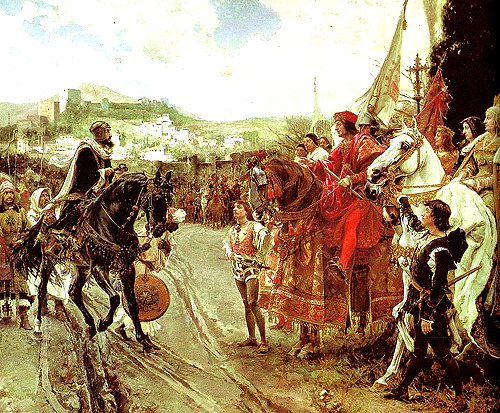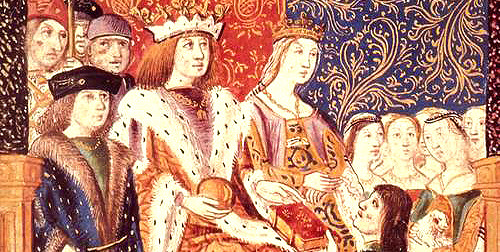

January 2, 1492: Granada surrenders to Spanish forces, ending Muslim rule in Iberia.
In the year 711, the first Muslim troops crossed from North Africa across the Strait of Gibraltar to Hispania, which they subsequently conquered over a seven-year campaign; the Umayyad drive north was ultimately halted at the Battle of Tours (Poitiers), but Muslim control over the Iberian Peninsula, formerly ruled by a Christian Visigothic kingdom, was complete. Yet even as the foundations of the state of Al-Andalus were being laid, the Reconquista had already begun - in 722, a Visigothic nobleman defeated defeated Umayyad forces at the battle of Covadonga, ensuring the survival of a small Visigothic entity in the Northern part of the Iberian Peninsula: the Kingdom of Asturias.
The Reconquista, according to traditional dates, lasted around seven centuries, and it was marked by shifting alliances and much in-fighting between Christian leaders. The 1212 Battle of Las Navas de Tolosa saw the defeat of the Almohad Caliphate at the hands of an alliance between Castile, Aragon, Navarre, and Portugal; the battle marked a major turning point in the Reconquista, and in the following decades Muslim-controlled territories fell into the hands of this allied force one by one, until only Granada and a handful of other cities were left to be retaken. After a yearlong siege, Muhammad XII surrendered the city of Granada to Ferdinand and Isabella, monarchs of Aragon and Castile, respectively (and future joint monarchs of a unified Spain).
Other links: On the subsequent Spanish Inquisition; on the Alhambra, the Muslim fortress complex in Granada